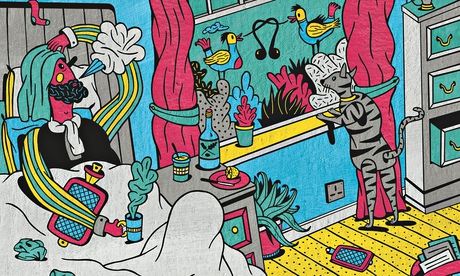
The school summer holidays are upon us – and for anyone who's a teacher, who lives with one, or who's merely friends with one, that means only one thing: Teacher Holiday Sickness Syndrome, a name I just made up for a phenomenon I certainly didn't. Within hours of the final bell, it seems, half the nation's educators contract a cold or something similar, necessitating several days of duvet-based self-pity. For anyone who's sceptical of the general idea that you can think yourself well – "You'll never get over that ebola infection unless you stay positive!" – this curious syndrome stands as a rebuke. Quasi-magically, teachers appear capable of declining to get ill when they can't afford to, postponing the symptoms till later. And it's not just teachers, or even humans: according to a new review in the Royal Society's flagship biology journal, animals – from birds to monkeys – seem to suppress the signs of illness when there's a really good reason, such as parenting duties, or sexual reproduction. Ailing male zebra finches become remarkably less ailing when there are female zebra finches around.
One possible explanation for this may lie in how we think about sickness. The usual assumption is that illness deprives you of certain abilities: it's the evil microbes that sap your energy, rob you of your powers of concentration and make you not want to socialise. According to an alternative evolutionary perspective, though, these "sickness behaviours" are actually helpful: things the body does in order to conserve energy and focus on getting well, as part of "a highly organised strategy to aid in fighting the infection", as the review's author, Patricia Lopes, puts it. You feel like hiding beneath the bedclothes, in other words, so that you're motivated to do so, because that's the best place for you to be. And so it follows that, if there's something even more important for a creature to be doing in order to propagate its genes – such as sex, or caring for infants – it might not feel those symptoms at that moment.
The happy implication here is that we might be better than we'd imagined at rising to the moment, putting illness aside when life's most important priorities demand it. The less happy implication is that there might be certain aspects of modern life – such as overdemanding bosses, or stacks of unmarked A-level history papers – that trigger the same response, even though they're not so crucial to survival. It's intriguing, by the way, that social status seems to play a role in this. In Lopes's study, animals lower down the pecking order were less likely to exhibit sickness behaviours, while higher-ups let themselves get ill and take a break.
Being ill and feeling ill, then, are two different things – so maybe you can't rely on your body to let you know when you're working yourself into the ground. Though it's also a reminder that feeling ill can serve a kind of function: it's a way of enforcing a slowdown. In short, though it's easier said than done: if you feel terrible, you need to focus on renewal and restoration – and if you don't feel terrible, you probably need to focus on renewal and restoration, too. Anyway, enjoy your holiday, teachers. I recommend whiskey with honey and lemon juice.
oliver.burkeman@theguardian.com
Follow Oliver on Twitter

